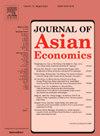宽带互联网接入如何影响生育决策:证据和机制
IF 3.4
3区 经济学
Q1 ECONOMICS
引用次数: 0
摘要
互联网基础设施的快速扩张极大地改变了人们日常生活的各个方面。在中国生育率下降的背景下,本研究采用差分中的差分(DID)策略,利用“宽带中国”倡议作为外生政策冲击,探讨宽带采用对生育行为的因果影响。实证结果表明,宽带扩张显著提高了育龄妇女的生育率,并且在多个敏感性检验中,结果仍然稳健。进一步的异质性分析表明,这种影响在年轻女性、农村居民、受教育程度较高的个体以及配偶较年轻或父母共同居住的个体中尤为明显。机制分析表明,宽带通过增加获得医疗保健服务的机会、促进灵活的就业安排和提高家庭财务抵御能力来促进生育率。这些发现强调了数字基础设施发展对人口的影响,并为缓解数字时代生育率下降提供了与政策相关的见解。本文章由计算机程序翻译,如有差异,请以英文原文为准。
How broadband internet access shapes fertility decisions: Evidence and mechanisms
The rapid expansion of internet infrastructure has substantially transformed various dimensions of daily life. In the context of China’s declining fertility rate, this study investigates the causal impact of broadband adoption on fertility behavior by employing a difference-in-differences (DID) strategy that exploits the Broadband China initiative as an exogenous policy shock. The empirical results indicate that broadband expansion significantly increases fertility rates among women of reproductive age, and the findings remain robust across multiple sensitivity checks. Further heterogeneity analysis shows that the effects are particularly pronounced among younger women, rural residents, individuals with higher educational attainment, and those with younger spouses or co-residing parents. Mechanism analysis suggests that broadband promotes fertility by enhancing access to healthcare services, facilitating flexible employment arrangements, and improving household financial resilience. These findings underscore the demographic consequences of digital infrastructure development and offer policy-relevant insights for mitigating fertility decline in the digital era.
求助全文
通过发布文献求助,成功后即可免费获取论文全文。
去求助
来源期刊

Journal of Asian Economics
ECONOMICS-
CiteScore
4.70
自引率
9.40%
发文量
90
期刊介绍:
The Journal of Asian Economics provides a forum for publication of increasingly growing research in Asian economic studies and a unique forum for continental Asian economic studies with focus on (i) special studies in adaptive innovation paradigms in Asian economic regimes, (ii) studies relative to unique dimensions of Asian economic development paradigm, as they are investigated by researchers, (iii) comparative studies of development paradigms in other developing continents, Latin America and Africa, (iv) the emerging new pattern of comparative advantages between Asian countries and the United States and North America.
 求助内容:
求助内容: 应助结果提醒方式:
应助结果提醒方式:


